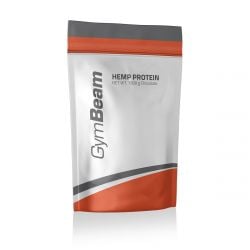We use cookies to make your experience better. To comply with the new e-Privacy directive, we need to ask for your consent to set the cookies. Learn more
Plant-Based Protein
Plant-Based Protein is a category of protein powders that are made from plant protein sources. These usually include hemp, legume (soy, pea) or grain (rice) protein powders, which are often also in BIO quality. Their biggest advantage is that they can be enjoyed by vegans as well as people who suffer from lactose intolerance. Similarly, they can be enjoyed by all those who do not avoid animal products, but would like to reduce their consumption or give a chance to new tastes.
In comparison with whey protein powders, the plant-based ones have a slight drawback in terms of a less favourable spectrum of essential amino acids (EAA). However, even this can be easily dealt with, as all you need is to just use a combination of multiple plant-based protein sources. Typically, it is recommended to combine legume with grain proteins. Moreover, it is best to increase their serving amount by about 25%. If you want to support the absorbability of the contained amino acids even further, it is advisable to complement the protein powder with probiotics.
Show moreWhat types of plant-based protein powders are there?
The individual types of plant-based protein powders differ mainly in their amino acid spectrum, absorbability, price, but also in the protein content. Let's take a closer look at them.
1. Soy protein powders
Soy protein powders usually contain between 65-85% of protein and rank among the most popular plant-based alternatives between vegans. This is especially due to their favourable content of EAA’s, which most closely resembles that of a quality whey protein powder. However, in comparison with them, they contain a little more sugar, which can be perceived by some as a minor drawback. Soy protein powders are especially popular among vegan athletes. The exemplary representative of protein powders from this category is Protein Soy Isolate.
2. Rice protein powders
Rice protein powders are produced from rice grains, and typically contain between 50-78% of protein. If you want to get the most out of a rice protein powder, it is ideal to combine it with legume proteins, which you can find, for example, in pea protein powder. The resulting protein blend will then have a substantially higher quality and complexity. The exemplary representative of protein powders from this category is the BIO Rice Protein.
3. Hemp protein powders
Hemp protein powders are made by pressing and grinding hemp seeds. Usually, they contain about 50% of protein, which is less than that of a whey protein powder. To get the most out of it, it is ideal to combine it with other plant-based sources of protein. The exemplary representative of protein powders from this category is the BIO Hemp Protein.
4. Pea protein powders
Pea protein powders rank among legume protein sources and are a fairly good alternative to whey protein powders. However, even in this case, it is best to combine them with a grain protein sources. Pea protein powders have typically a slightly higher fibre content, which can be an advantage in case you want to stay satiated for longer. On the contrary, it can be a drawback in case you are shooting for a rapid post-workout regeneration. The exemplary representative of protein powders from this category is the BIO Pea Protein.
5. Sunflower protein powders
Sunflower protein powders are made from select sunflower seeds. Similarly to pea protein powders, sunflower protein powders also boast a higher fibre content, which can be ideal if you're using the protein powder as a satiating snack. Sunflower protein powders typically contain about 50% of protein, which is a lot less than whey protein powders. The exemplary representative of protein powders from this category is BIO Sunflower Protein.
6. Multicomponent plant-based protein powders
Multicomponent plant-based proteins rank among the best possible choices from among vegan protein powders. A big advantage is that they contain proteins from different sources. This eliminates the drawback of limiting (underrepresented) amino acids, which results in a protein powder with a fairly favourable spectrum of essential amino acids (EAA). The basis of such protein powders is often a combination of proteins from grains and legumes, which is as close as it gets to whey protein powders in terms of quality. When talking about plant-based multicomponent protein powders, you can regularly encounter, for example, the combination of pea and rice protein. An exemplary representative of protein powders from this category is the BIO Vegan Protein.
Who are plant-based protein powders suitable for?
- Athletes who wish to promote muscle growth but avoid animal proteins.
- People who are trying to lose weight and need to increase their protein intake.
- Vegans and vegetarians.
- People who suffer from lactose intolerance.
- People who want to diversify their diet by using plant-based proteins.
- Cooks who want to enrich their food with plant-based proteins.
- Anyone who needs to increase the amount of protein in their diet.
What's the optimal serving amount of plant-based protein powders?
In the case of protein powders, the usual recommended serving amount ranges between 0.25 – 0.3 g of protein per kg of body weight. However, if you don't feel like pulling out your calculator every time, there is no harm in taking between 20 – 40 g of the protein blend. This corresponds to a more or less filled 30g measuring cup.
In case you opt for a plant-based protein powder, it is advisable to increase your intake by approximately 25% in comparison with an animal protein powder. This is because plant protein sources typically contain smaller amounts of both leucine and EAA’s. To further improve the digestibility of a plant-based protein powders, you can reach for probiotics.
How to take plant-based protein powders?
- A classic way to take protein powders is to mix them together with water or milk and create a delicious drink to use after training or at any time of the day.
- They also taste great in oat or other porridges, which will benefit from the taste and a serving of vital proteins.
- You can also add them to dough and create protein-packed desserts.
- The unflavoured versions are then a perfect choice for preparing savoury dishes, such as protein pizza.
- They can also be added to smoothies or coffee. This way, you can easily enrich these drinks with the necessary proteins.
Do you want to learn more about protein powders and how to choose the right one? Then you should check out our article: How to Choose the Right Protein for Weight Loss or Muscle Growth?
Show less




















